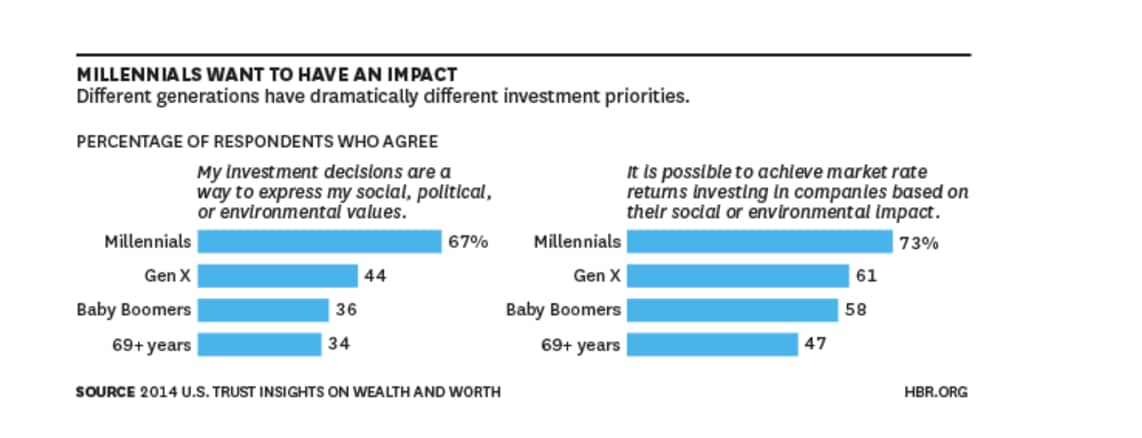Here’s what millennials really want from business, and why

Millennials want business to be a force for positive change
Stay up to date:
Youth Perspectives
The global business community is being challenged by millennials’ who want to change the world — and the results are going to be incredible.
While the older generations want more profit, millennials are shifting their business goal to social impact.
Almost 25,000 people aged between 18 and 35 from 186 countries and territories took part in the Global Shapers Annual Survey 2017. It found that over 40% of young people think sense of purpose/impact on society is one of the most important criteria when considering a career opportunity.

Meanwhile, according to Deloitte’s 2017 Millennial Survey, members of Generation Y —80,000 across 30 countries— want “business as a force for positive change” as they become steadily more pro-business.
The survey indicates an overwhelming increase in the number of millennials with an ambition other than making money. While 88% say that businesses have a positive impact on society, 62% say that contemporary business leaders are committed to improving it.
Millennials believe business must impact society vis-à-vis issues including “education, skills, and training, economic stability, cyber security, health care and disease prevention, unemployment, and climate change,” the survey found.

All in all, social impact is a stronger driving force for millennial business owners than personal profit making.
Here are a few reasons behind the new trend.
1) Millennials want to change the world around them
When findings say Gen-Y is committed to “making a difference” and considers business as a positive force, one message becomes clearer: the generation is ready to change the world.
The fact that more than 50% of young people agree to take a pay cut to find a job that aligns with their values is strong evidence of this.
Nonetheless, this mission will be extremely tough. So, how do millennials go about it?
It comes down to choosing detrimental financial gains or service for humanity.
Fortunately, more than 70% millennials are interested in young professional groups with a non-profit mission.
Millennials are setting the pace for a more compassionate and sustainable world by turning businesses into tools of social change.
2) For millennials, value takes priority
Making money and having an impact are often conflicting goals.
Deloitte’s survey shows that almost 9 in 10 millennials (86%) believe that financial performance shouldn’t be the only yardstick of business success. Rather, social impacts should take priority. But, in the case of dual-goal pursuit, they want business leaders “to improve performance of both business, as well as society as a whole.”
The average millennial is motivated by purpose. This might seem strange, but the inherent culture of the generation motivates the demography to donate and volunteer more, indulge in philanthropic causes, as well as civic engagements. Another study by the World Economic Forum found that the mission “to improve society” is the preferred priority millennials want for any business.
3) It's a world of social impact
Fortunately, it turns out that millennials’ sacrifice is paying off.
How?
Millennials have an outsized influence on the business world in a variety of ways.
Aside from the fact that they’re the largest part of the labour force and that proportion is growing, millennial customers also dominate the market. So, everything is centred on the unique values of this generation. The future of work and business lies in their hands.
In fact, businesses and brands that embrace social impact thrive better in today’s world of millennials.

The above table, showing research by Harvard Business Review, shows the high number of millennials whose investment priority is impact, not money.
Why social impact matters
Let’s face it. Social responsibility is a core priority to millennials. According to a United States Treasury survey, the digital generation is investing more in, and prefer working with, socially responsible entities.
In the US alone, members of this unique generation (75 million), are set to become the wealthiest in American history, after becoming the largest. Some $41 trillion will be passed on to them over the next three decades, reports forecast.
If corporate social responsibility (CSR) truly attracts millennials’ trust and loyalty, then what the future holds for businesses and the larger society is not hard to predict.
Don't miss any update on this topic
Create a free account and access your personalized content collection with our latest publications and analyses.
License and Republishing
World Economic Forum articles may be republished in accordance with the Creative Commons Attribution-NonCommercial-NoDerivatives 4.0 International Public License, and in accordance with our Terms of Use.
The views expressed in this article are those of the author alone and not the World Economic Forum.
Related topics:
Forum Stories newsletter
Bringing you weekly curated insights and analysis on the global issues that matter.
More on Youth PerspectivesSee all
Kulé Galma
April 15, 2025
Roberta Bosurgi and Ruma Bhargawa
March 7, 2025
Christa Odinga-Svanteson
March 7, 2025
Mario Truss and Benedikt Gieger
February 18, 2025
Julie Linn Teigland
January 23, 2025





